Critical Theory
Critical Theory

Caliban and the Witch
Caliban and The Witch: Women, The Body and Primitive Accumulation is a history of the body in the transition to capitalism. Moving from the peasant revolts of the late Middle Ages to the witch-hunts and the rise of mechanical philosophy, Federici investigates the capitalist rationalization of social reproduction. She shows how the battle against the rebel body and the conflict between body and mind are essential conditions for the development of labor power and self-ownership, two central principles of modern social organization.
"In the neoliberal era of postmodernism, the proletariat is whited-out from the pages of history. Federici recovers its historical substance by telling its story starting at the beginning, with the throes of its birth. This is a book of remembrance, of a trauma burned into the body of women, which left a scar on humanity's memory as deep and painful as those caused by famine, slaughter, and enslavement." — Peter Linebaugh
Silvia Federici is a longtime feminist activist and teacher. In 1972 she was among the founders of the International Feminist Collective, the organization that launched the Campaign for Wages For Housework in the US and abroad. She has also been active in the anti-globalization movement and the anti-death penalty movement. Silvia Federici was a founding member of the Committee for Academic Freedom in Africa, which for more than ten years documented the struggle of African students against the austerity programs imposed by the IMF and the World Bank on African countries. She has taught in the US and in Nigeria and is Emerita Professor of Political Philosophy and International Studies at Hofstra University (Hempstead, New York). Federici is the author of many book and essays on political philosophy, feminist theory, political philosophy, cultural studies, and education.
Published 2004.
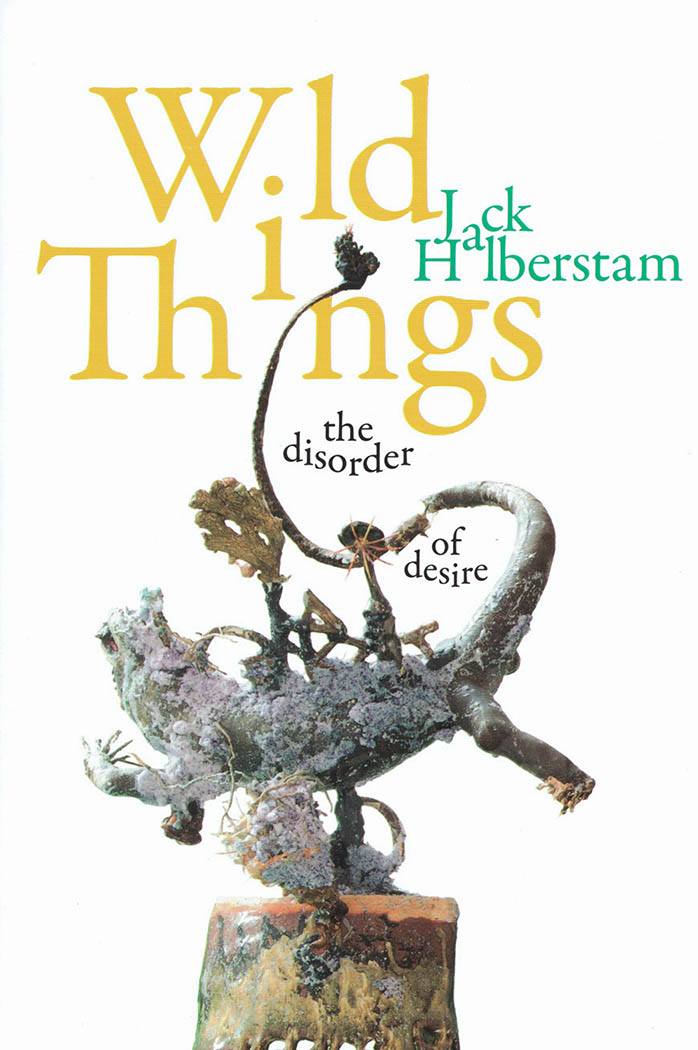
Wild Things: The Disorder of Desire
Halberstam offers an alternative history of sexuality by tracing the ways in which the wild, a space located beyond normative borders of sexuality, offers sources of opposition to knowing and being that transgress Euro-American notions of the modern subject.
"WILD THINGS is queer theorist Jack Halberstam's account of sexuality in general, and queerness in particular, after nature. As the heterosexual/homosexual binary emerged in the late 19th-century and coalesced in the 20th-century, discourses of both heterosexuality and homosexuality defined sexuality in relation to nature and the natural world. The most well-known is the homophobic framing of homosexuality as unnatural, aberrant, and "against" nature, but of equal importance is the 19th-century male dandy's positioning of artifice and camp-and through it homosexuality-as anti-natural. On the other hand, heterosexuality was often held up as the "natural" sexuality and, later in the 20th-century, gay scientists tried to prove that homosexuality was a natural, biological desire.
In this book, Halberstam mobilizes wildness as an analytic through which an alternative history of sexuality and desire outside of heterosexuality, homosexuality, and taxonomical classifications can emerge. To that end, Halberstam turns back to the orderly, taxonomical, and classified homosexuality and heterosexuality of the 19th and 20th-centuries and asks: what embodiments and desires were swept under the carpet in the process of creating identitarian sexualities?
Halberstam claims these excluded and unruly figures as "wild" lives lived out in embodiments and desires which eluded the orderly classifications of their era. Wildness, for Halberstam, thus becomes a way to claim an "epistemology of the ferox," a way of being and knowing in the world which is not the opposition of order but order's absence: a force which "disorders desire and desires disorder."
Although he is clear that wildness and queerness are not interchangeable, Halberstam sees in wildness and "wild thought" queer theory's anti-identitarian impulse to explore life outside of the limits of the human and liberal governance. More than just a project of recuperating queer figures lost in the archive, Halberstam's WILD THINGS argues for a revision of queer history, one in which "nature" and the "natural world" does not function as that which sexuality defines itself with and against"
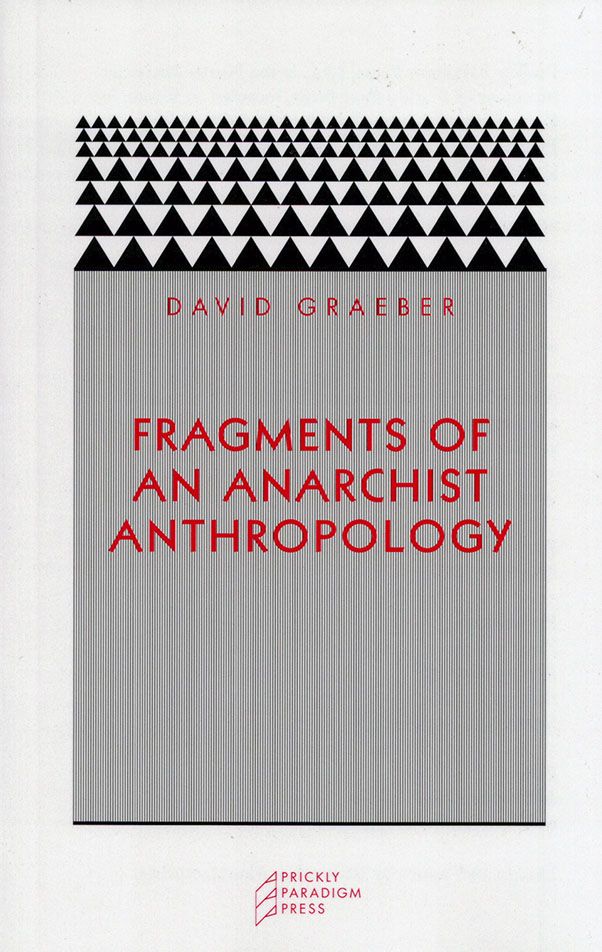
Fragments of An Anarchist Anthropology
Everywhere anarchism is on the upswing as a political philosophy—everywhere, that is, except the academy. Anarchists repeatedly appeal to anthropologists for ideas about how society might be reorganized on a more egalitarian, less alienating basis. Anthropologists, terrified of being accused of romanticism, respond with silence . . . . But what if they didn't?
This pamphlet ponders what that response would be, and explores the implications of linking anthropology to anarchism. Here, David Graeber invites readers to imagine this discipline that currently only exists in the realm of possibility: anarchist anthropology.
David Graeber (1961-2020) was an American anthropologist and activist. He was a professor of anthropology at the London School of Economics and a leading figure in the Occupy Wall Street movement. His books include Toward an Anthropological Theory of Value: The False Coin of Our Own Dreams, Lost People: Magic and the Legacy of Slavery in Madagascar, and Debt: The First 5000 Years.

Decoding Dictatorial Statues
Decoding Dictatorial Statues, a project by Korean graphic design researcher Ted Hyunhak Yoon, is a collection of images and texts revolving around the different ways we can look at statues in public space. How can we decode statues and their visual languages, their object hood and materiality, their role as media icons and their voice in political debates?
Anticipating to current debates the book responds to urgent concerns about the representation of our heritage by not only asking us to examine what history to put on a pedestal, but to also consider the visual language of the statue itself. Decoding Dictatorial Statues therefore offers opportunity to level with the actual affairs the statues promote. In parallel to this deconstruction of the politics of a statue’s gestures the project discusses symbolic notion of culture and design by offering opportunity to another, and more cross-cultural understanding.
Ted Hyunhak Yoon(b.1987) is a graphic designer∙researcher based in Seoul(KR)∙Maastricht(NL). He graduated from MA Visual Communication, Royal College of Art in London, UK. From April 2017 onwards, he is a participant of a residency programme in Jan van Eyck Academie, Maastricht, Netherlands.
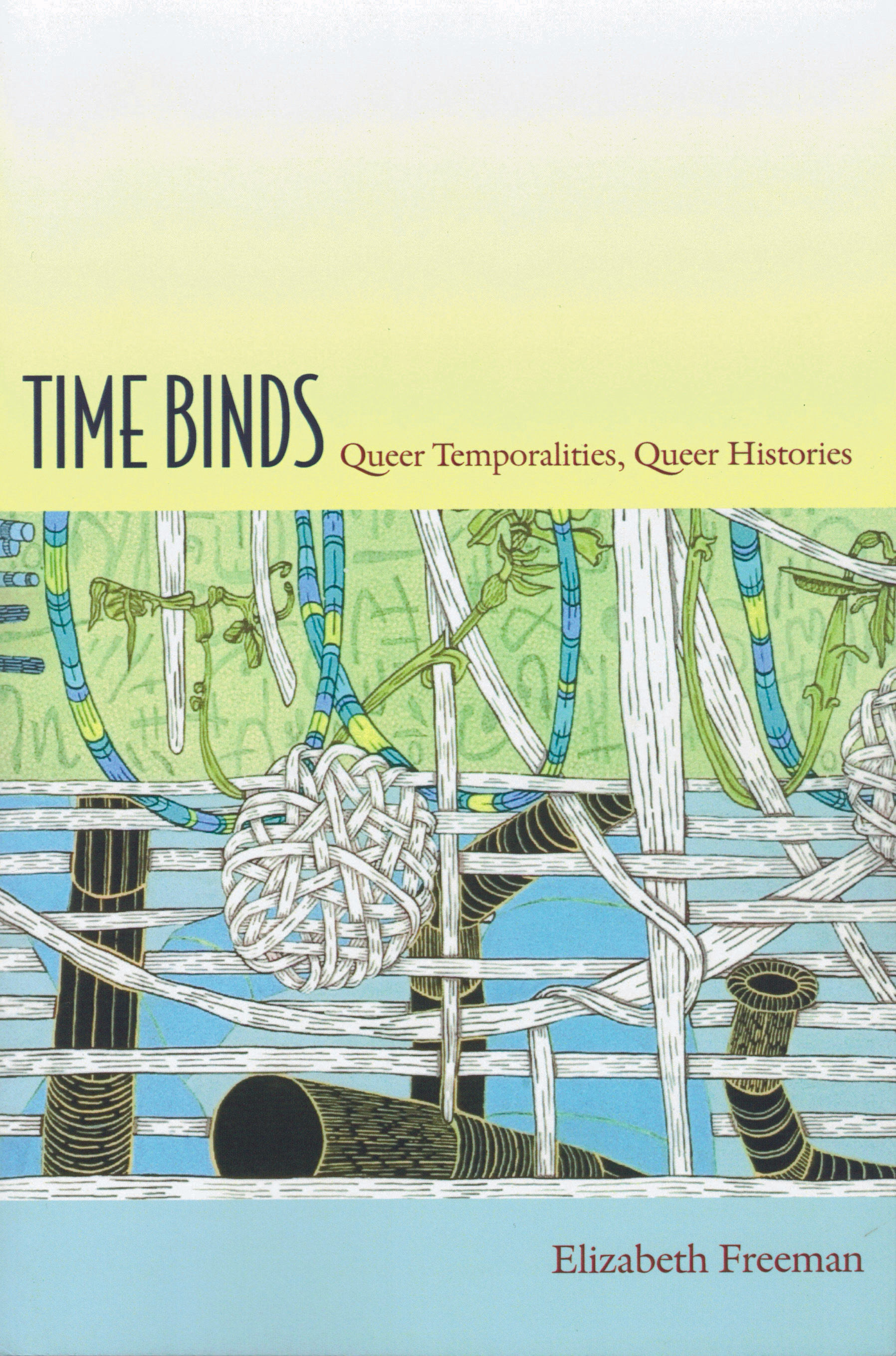
Time Binds - Queer Temporalities, Queer Histories
Time Binds is a powerful argument that temporal and sexual dissonance are intertwined, and that the writing of history can be both embodied and erotic. Challenging queer theory’s recent emphasis on loss and trauma, Elizabeth Freeman foregrounds bodily pleasure in the experience and representation of time as she interprets an eclectic archive of queer literature, film, video, and art. She examines work by visual artists who emerged in a commodified, “postfeminist,” and “postgay” world. Yet they do not fully accept the dissipation of political and critical power implied by the idea that various political and social battles have been won and are now consigned to the past. By privileging temporal gaps and narrative detours in their work, these artists suggest ways of putting the past into meaningful, transformative relation with the present. Such “queer asynchronies” provide opportunities for rethinking historical consciousness in erotic terms, thereby countering the methods of traditional and Marxist historiography. Central to Freeman’s argument are the concepts of chrononormativity, the use of time to organize individual human bodies toward maximum productivity; temporal drag, the visceral pull of the past on the supposedly revolutionary present; and erotohistoriography, the conscious use of the body as a channel for and means of understanding the past. Time Binds emphasizes the critique of temporality and history as crucial to queer politics.
Elizabeth Freeman is Associate Professor of English at the University of California, Davis. She is the author of The Wedding Complex: Forms of Belonging in Modern American Culture, also published by Duke University Press.
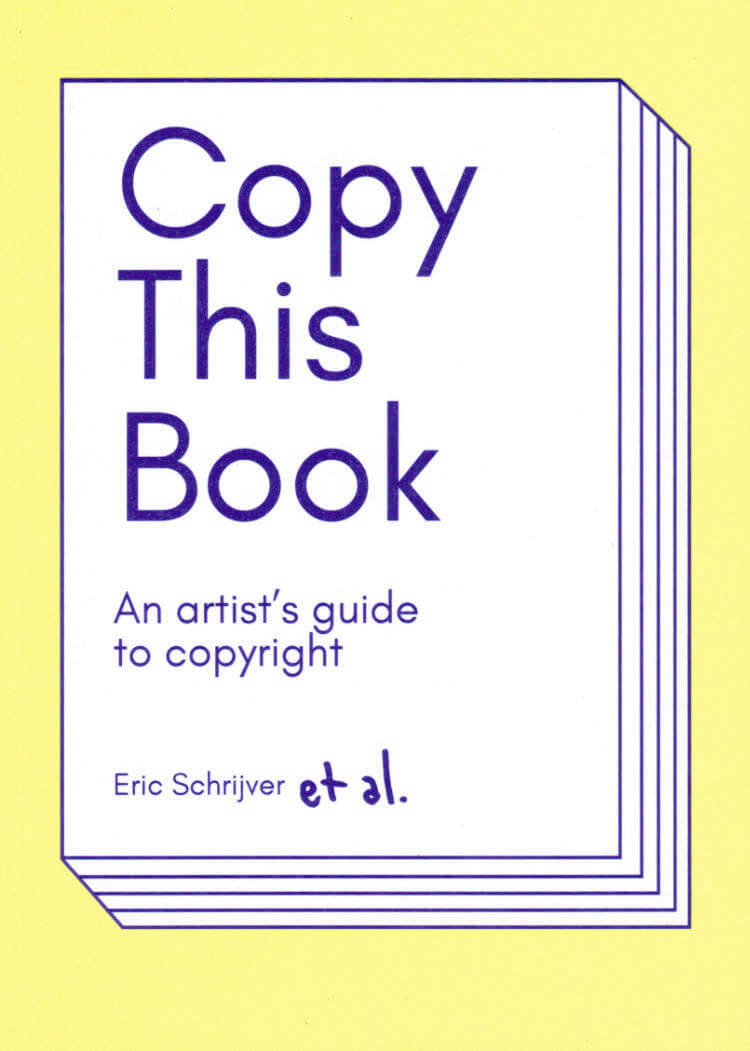
Copy This Book
This book is an artist’s guide to copyright, written for makers. Both practical and critical, this book will guide you through the concepts underlying copyright and how they apply in your practice.
How do you get copyright? For what work? And for how long? How does copyright move across mediums, and how can you go about integrating the work of others? Because they get copyright too!
Copy this Book will detail the concepts of authorship and original creation that underlie our legal system. This way, it will equip you with the conceptual keys to participate in the debate on intellectual property today.
This sharp and useful book shines a light on the rights of all artists to protect—and share—their work. Eric Schrijver has produced an essential guide for navigating the new Commons and the old laws of copyright control.
— Ellen Lupton, curator and critic
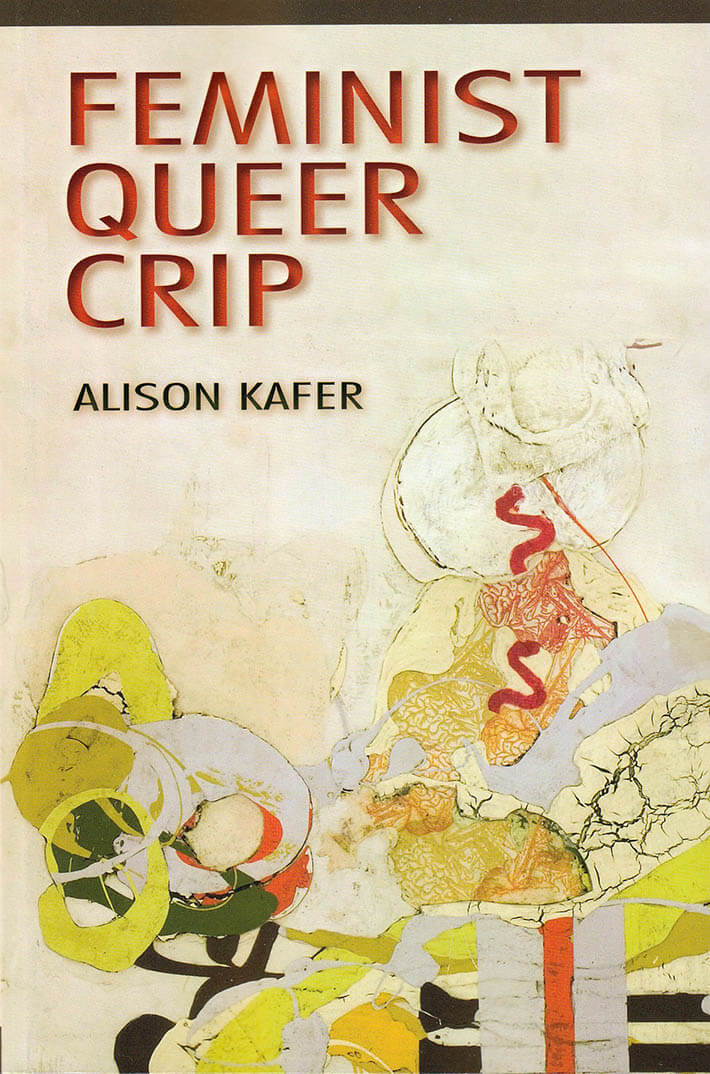
Feminist, Queer, Crip
In Feminist, Queer, Crip Alison Kafer imagines a different future for disability and disabled bodies. Challenging the ways in which ideas about the future and time have been deployed in the service of compulsory able-bodiedness and able-mindedness, Kafer rejects the idea of disability as a pre-determined limit. She juxtaposes theories, movements, and identities such as environmental justice, reproductive justice, cyborg theory, transgender politics, and disability that are typically discussed in isolation and envisions new possibilities for crip futures and feminist/queer/crip alliances. This bold book goes against the grain of normalization and promotes a political framework for a more just world.
Alison Kafer is associate professor of feminist studies, and is the author of Feminist, Queer, Crip (Indiana, 2013). Her work has appeared in a number of journals and anthologies, including Disability Studies Quarterly, Feminist Disability Studies, the Journal of Literary and Cultural Disability Studies, Sex and Disability, and South Atlantic Quarterly.
Published 2013.
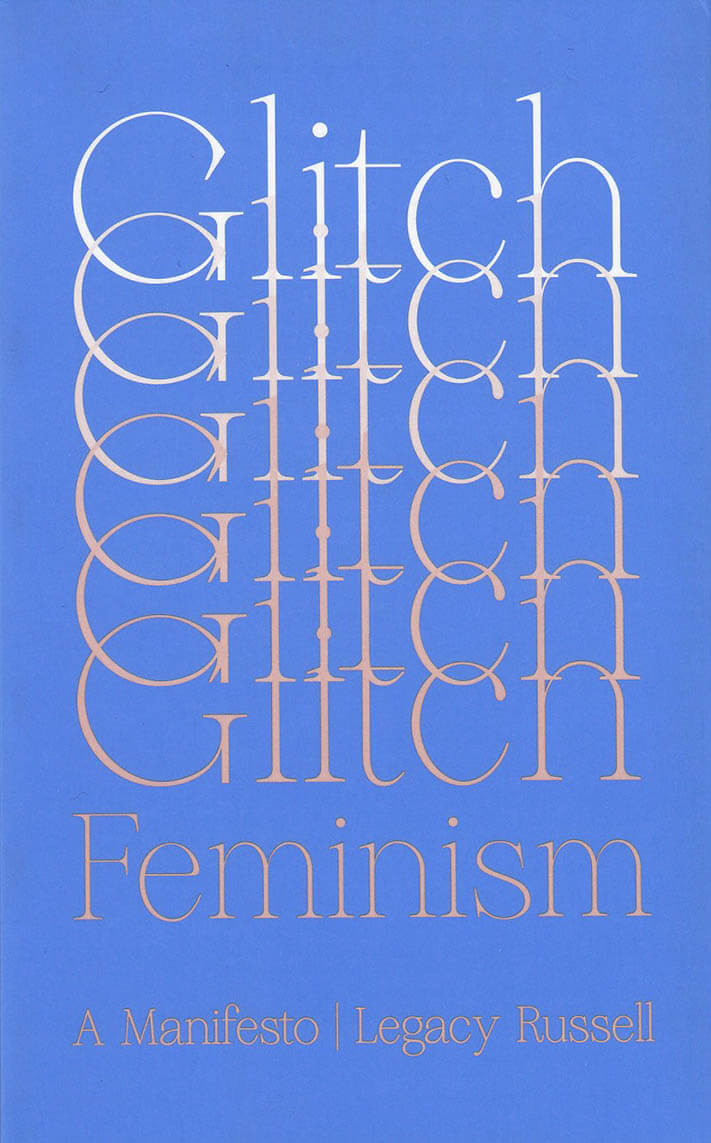
Glitch Feminism
A new manifesto for cyberfeminism.
The divide between the digital and the real world no longer exists: we are connected all the time. What must we do to work out who we are, and where we belong? How do we find the space to grow, unite and confront the systems of oppression? This conflict can be found in the fissures between the body, gender and identity. Too often, the glitch is considered a mistake, a faulty overlaying, a bug in the system; in contrast, Russell compels us to find liberation here. In a radical call to arms, Legacy Russell argues that we need to embrace the glitch in order to break down the binaries and limitations that define gender, race, sexuality.
Glitch Feminism is a vital new chapter in cyberfeminism, one that explores the relationship between gender, technology and identity. In an urgent manifesto, Russell reveals the many ways that the glitch performs and transforms: how it refuses, throws shade, ghosts, encrypt, mobilises and survives. Developing the argument through memoir, art and critical theory, Russell also looks at the work of contemporary artists who travel through the glitch in their work. Timely and provocative, Glitch Feminism shows how an error can be a revolution.

Axiomatic
How to speak of the searing, unpindownable power that the past-ours, our family's, our culture's-wields in the present? Drawing on nine years of research, Axiomatic explores the ways we understand the traumas we inherit and the systems that sustain them. In five sections-each one built on an axiom about how the past affects the present-Tumarkin weaves together true and intimate stories of a community dealing with the extended aftermath of a suicide, a grandmother's quest to kidnap her grandson to keep him safe, one community lawyer's struggle inside and against the criminal justice system, a larger-than-life Holocaust survivor, and the history of the author's longest friendship. With verve, wit, and critical dexterity, Tumarkin asks questions about loss, grief, and how our particular histories inform the people we become in the world.
Maria Tumarkin is a writer and cultural historian. A recipient of the Windham-Campbell Prize, she is the author of three previous books of ideas, Traumascapes, Courage, and Otherland, all of which received critical acclaim in Australia, where she lives. Her most recent work, Axiomatic, was a finalist for the National Book Critics Circle Award.
Published 2019.
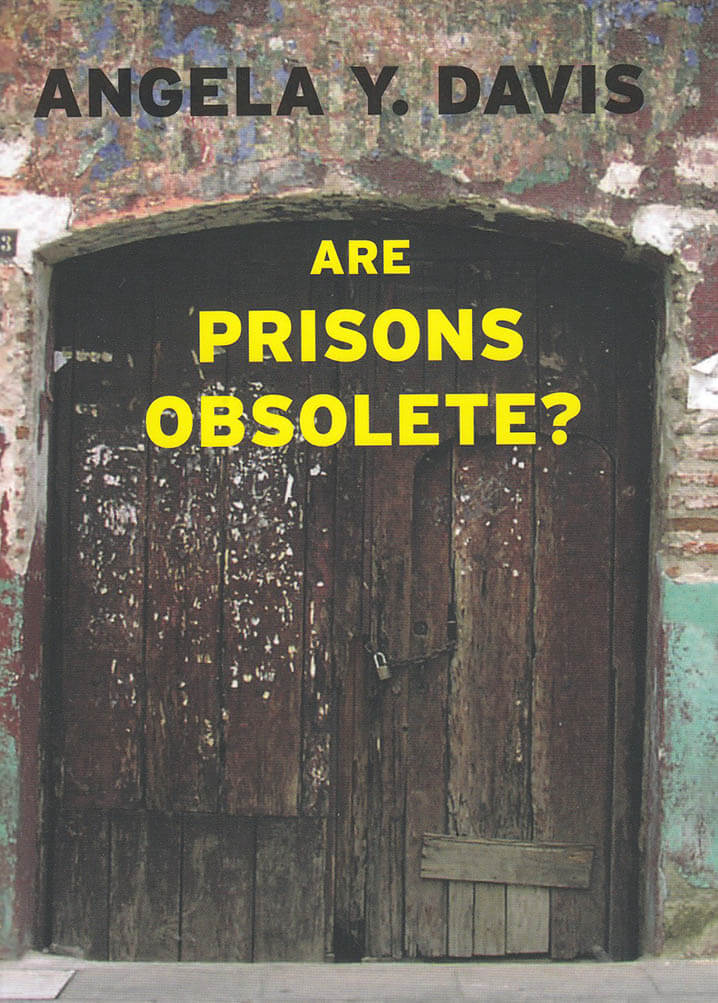
Are Prisons Obsolete?
With her characteristic brilliance, grace and radical audacity, Angela Y. Davis has put the case for the latest abolition movement in American life: the abolition of the prison. As she quite correctly notes, American life is replete with abolition movements, and when they were engaged in these struggles, their chances of success seemed almost unthinkable. For generations of Americans, the abolition of slavery was sheerest illusion. Similarly, the entrenched system of racial segregation seemed to last forever, and generations lived in the midst of the practice, with few predicting its passage from custom. The brutal, exploitative (dare one say lucrative?) convict-lease system that succeeded formal slavery reaped millions to southern jurisdictions (and untold miseries for tens of thousands of men, and women). Few predicted its passing from the American penal landscape. Davis expertly argues how social movements transformed these social, political and cultural institutions, and made such practices untenable.
In Are Prisons Obsolete?, Professor Davis seeks to illustrate that the time for the prison is approaching an end. She argues forthrightly for "decarceration", and argues for the transformation of the society as a whole.
Published 2003.

The Other Citizen
Drawing upon traditions of socially engaged poetics, Brandon LaBelle's The Other Citizen presents narratives of contemporary crisis and exclusionary politics—from American teenagers in the maze of neoliberal privatization to those caught between borders of nation-states—outlining the force of a planetary citizenry.
Brandon LaBelle is a musician, artist, writer, theorist, curator and editor (founder of Errant Bodies). His work is based on performance, sound installation, recording and use of found sounds. LaBelle reflects fluently on his artistic practice, drawing attention to the social dimensions of listening and manner in which sounds, in multiple variations, play upon public spaces, and drawing connections across media and incorporate video, as well as architectural and sculptural vocabularies into an expanded field that embraces rhetorical and spatial challenges.
Published September 2020.
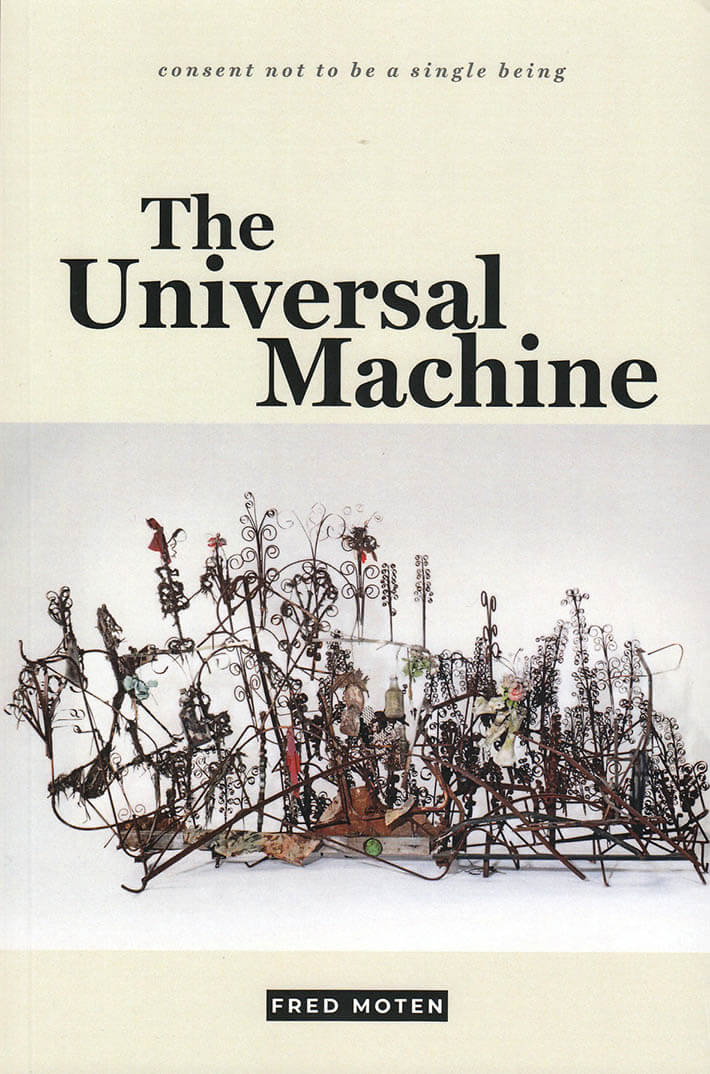
The Universal Machine
In The Universal Machine — the concluding volume to his landmark trilogy consent not to be a single being — Fred Moten presents a suite of three essays on Emmanuel Levinas, Hannah Arendt, and Frantz Fanon, in which he explores questions of freedom, capture, and selfhood. In trademark style, Moten considers these thinkers alongside artists and musicians such as William Kentridge and Curtis Mayfield while interrogating the relation between blackness and phenomenology.
Whether using Levinas's idea of escape in unintended ways, examining Arendt's antiblackness through Mayfield's virtuosic falsetto and Anthony Braxton's musical language, or showing how Fanon's form of phenomenology enables black social life, Moten formulates blackness as a way of being in the world that evades regulation. Throughout The Universal Machine—and the trilogy as a whole—Moten's theorizations of blackness will have a lasting and profound impact.
Published July 2018
Fred Moten is Professor of Performance Studies at New York University and the author of Black and Blur and Stolen Life, both also published by Duke University Press, and In the Break: The Aesthetics of the Black Radical Tradition.

University of California Press
The Gentrification of The Mind
In this gripping memoir of the AIDS years (1981–1996), Sarah Schulman recalls how much of the rebellious queer culture, cheap rents, and a vibrant downtown arts movement vanished almost overnight to be replaced by gay conservative spokespeople and mainstream consumerism.
Schulman takes us back to her Lower East Side and brings it to life, filling these pages with vivid memories of her avant-garde queer friends and dramatically recreating the early years of the AIDS crisis as experienced by a political insider. Interweaving personal reminiscence with cogent analysis, Schulman details her experience as a witness to the loss of a generation’s imagination and the consequences of that loss.
Published 2012

Red Love: A Reader on Alexandra Kollontai / Kollantai: A Play by Agneta Pleijel
Joanna Warsza, Michele Massucci and 1 more
Alexandra Kollontai was a Russian revolutionary who was appointed commissar of social welfare after the October Revolution and later one of the world’s first woman ambassadors. She fought for abortion rights, secularized marriage, and paid maternity leave—and considered “comradely love” to be a political force. This reader, in which artists and thinkers revisit Kollontai’s legacy in light of current feminist struggles, stems from a research project by CuratorLab at Konstfack and Tensta konsthall that accompanied Dora García’s exhibition “Red Love.” It also features the first English translation of the 1977 biographical play Kollontai by Swedish writer Agneta Pleijel.
Edited by MARIA LIND, MICHELE MASUCCI, JOANNA WARSZA
Contributions by BINI ADAMCZAK, SARA AHMED, GIULIA ANDREANI, LISE HALLER BAGGESEN, DORA GARCÍA, MICHAEL HARDT, MARIA LIND, MICHELE MASUCCI, ALLA MITROFANOVA, MARTYNA NOWICKA-WOJNOWSKA, PONTUS PETTERSSON, JONATHAN BROOKS PLATT, AGNETA PLEIJEL, NINA POWER, PAUL B. PRECIADO, THOMAS RAFA, ALICJA ROGALSKA, MOHAMMAD SALEMY, SALLY SCHONFELDT, AARON SCHUSTER, SOPHIA TABATADZE, PETRA BAUER & REBECKA THOR, OXANA TIMOFEEVA, JOANNA WARSZA, HANNAH ZAFIROPOULOS

Salvage 8: Comrades, this is madness
The Salvage Editorial Collective on the Covid-19 crisis.
Including: ‘Mothering Against the World' by Sophie Lewis on ‘Momrades’, ‘The Bushes’ a new fiction by China Miéville, ‘Hookers and Other Angels’ photography from Juno Mac, ‘Prepared for the Worst’ by Richard Seymour on Disaster Nationalism, ‘Welfare State Populism and the “Left-Behind Left”’ by Kevin Ochieng Okoth, ‘A Glimmer of a Shell of a Husk’ by Maya Osborne; ‘The Phallic Road to Socialism’ by Sebastian Budgen; A newly translated interview with Daniel Guérin, ‘Nationalism After Coronavirus’ by Sivamohan Valluvan, ‘Striking in Striking Times: Capitalism’s Coronavirus Crisis’ by Gregor Gall, ‘Getting Dressed for a Pandemic’ by Camila Valle, ‘Out of the Iron Lung: A Miasma Theory of Coronavirus’ by Matthew Broomfield.
Poetry by Nisha Ramayya, this issue’s featured poet, and an interview with her conducted by Salvage poetry editor, Caitlín Doherty. Plus the return of the Salvage Editorial Collective perspectives pamphlet, and a postcard.
Salvage is a bi-annual journal of revolutionary arts and letters. Salvage is written by and for the desolated Left, by and for those sick of capitalism and its planetary death-drive, implacably opposed to the fascist reflux and all ‘national’ solutions to our crisis, committed to radical change, guarded against the encroachments of ‘woke’ capitalism and its sadistic dramaphagy, and impatient with the Left’s bad faith and bullshit.
Published June 2020
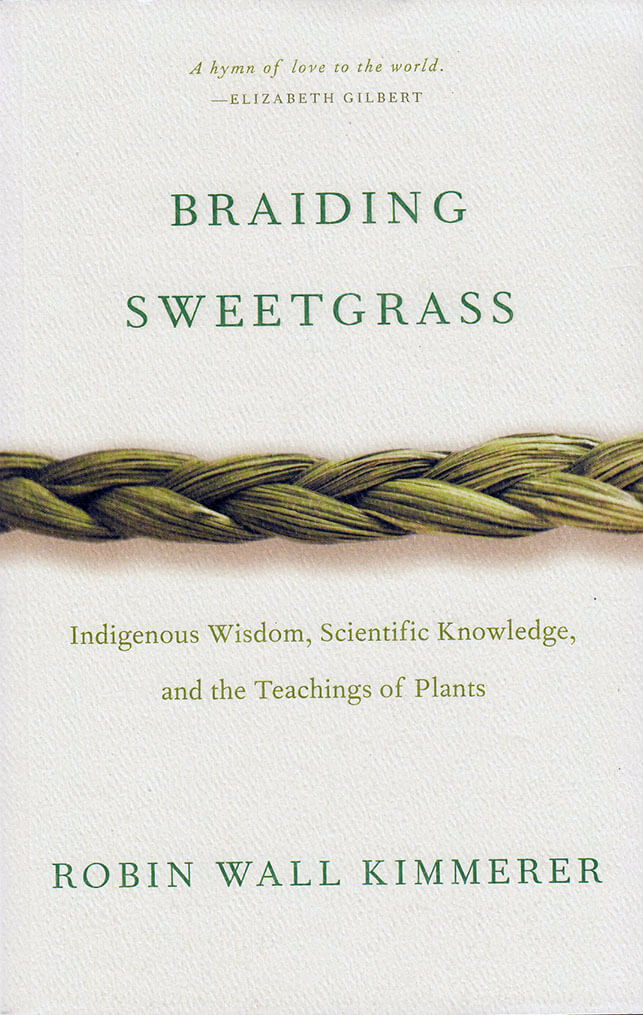
Braiding Sweetgrass
"As a leading researcher in the field of biology, Robin Wall Kimmerer understands the delicate state of our world. But as an active member of the Potawatomi nation, she senses and relates to the world through a way of knowing far older than any science. In Braiding Sweetgrass, she intertwines these two modes of awareness — the analytic and the emotional, the scientific and the cultural—to ultimately reveal a path toward healing the rift that grows between people and nature. The woven essays that construct this book bring people back into conversation with all that is green and growing; a universe that never stopped speaking to us, even when we forgot how to listen"
Robin Wall Kimmerer is a mother, scientist, decorated professor, and enrolled member of the Citizen Potawatomi Nation. She is the author of Braiding Sweetgrass: Indigenous Wisdom, Scientific Knowledge and the Teaching of Plants and Gathering Moss: A Natural and Cultural History of Mosses. She lives in Syracuse, New York, where she is a SUNY Distinguished Teaching Professor of Environmental Biology, and the founder and director of the Center for Native Peoples and the Environment.
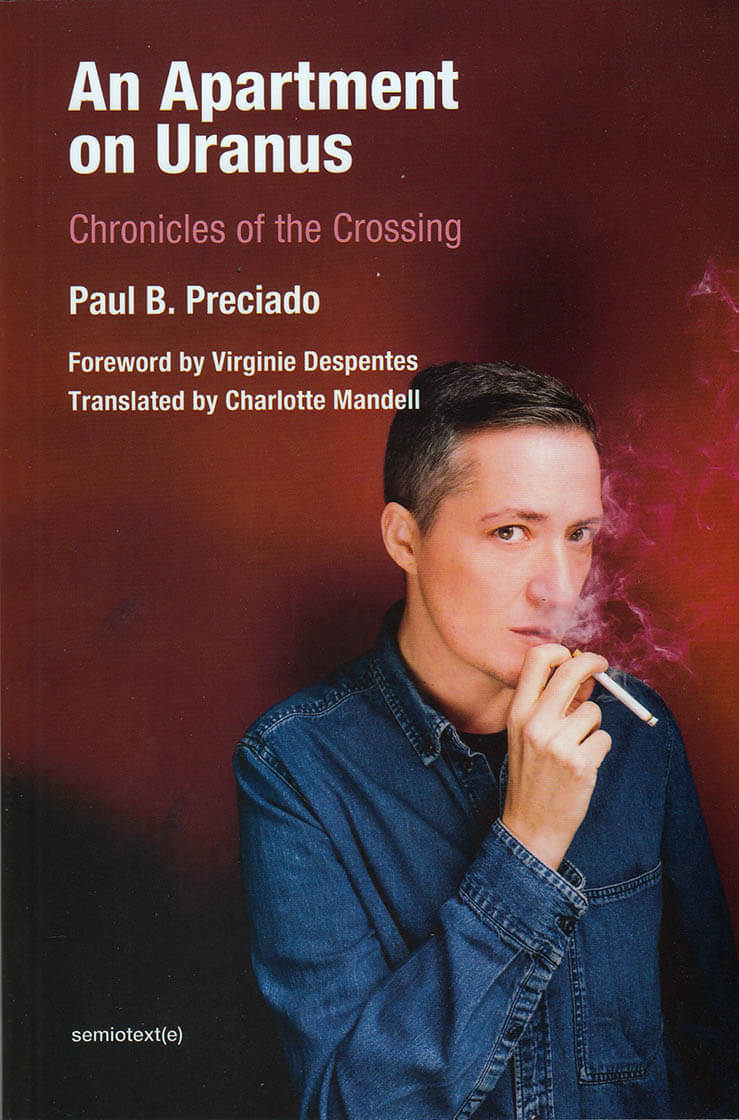
An Apartment on Uranus
A “dissident of the gender-sex binary system” reflects on gender transitioning and political and cultural transitions in technoscientific capitalism.
Uranus, the frozen giant, is the coldest planet in the solar system as well as a deity in Greek mythology. It is also the inspiration for uranism, a concept coined by the writer Karl Heinrich Ulrich in 1864 to define the “third sex” and the rights of those who “love differently.” Following Ulrich, Paul B. Preciado dreams of an apartment on Uranus where he might live beyond existing power, gender and racial strictures invented by modernity. “My trans condition is a new form of uranism,” he writes. “I am not a man. I am not a woman. I am not heterosexual. I am not homosexual. I am not bisexual. I am a dissident of the gender-sex binary system. I am the multiplicity of the cosmos trapped in a binary political and epistemological system, shouting in front of you. I am a uranist confined inside the limits of technoscientific capitalism.”
This book recounts Preciado's transformation from Beatriz into Paul B., but it is not only an account of gender transitioning. Preciado also considers political, cultural, and sexual transition, reflecting on issues that range from the rise of neo-fascism in Europe to the technological appropriation of the uterus, from the harassment of trans children to the role museums might play in the cultural revolution to come.
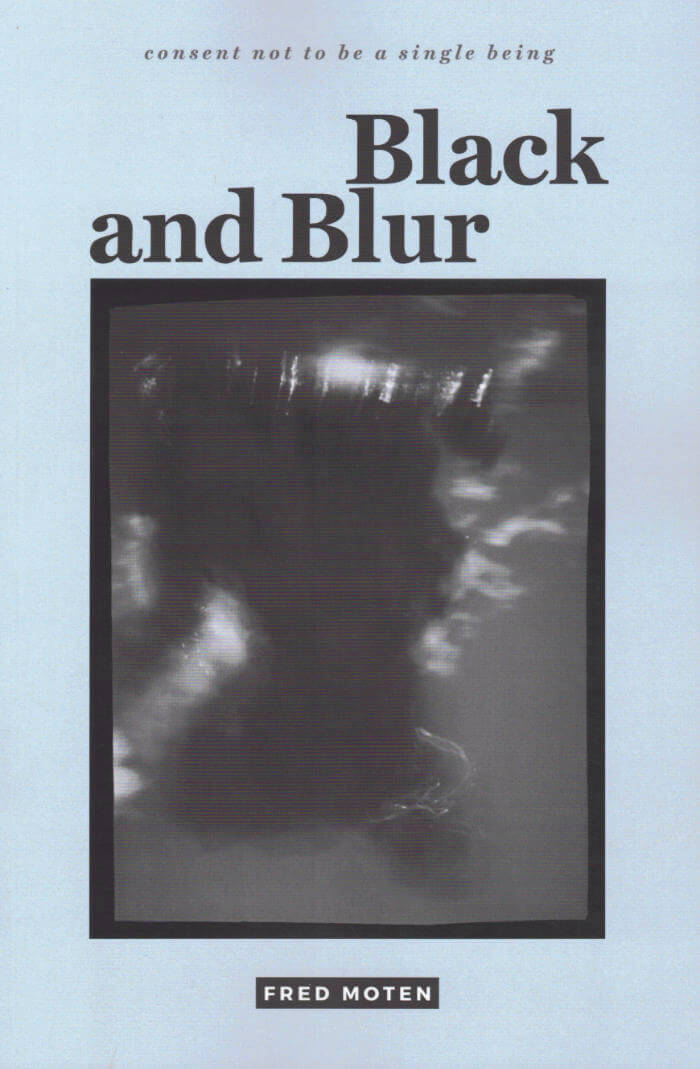
Black and Blur
In Black and Blur—the first volume in his sublime and compelling trilogy consent not to be a single being—Fred Moten engages in a capacious consideration of the place and force of blackness in African diaspora arts, politics, and life. In these interrelated essays, Moten attends to entanglement, the blurring of borders, and other practices that trouble notions of self-determination and sovereignty within political and aesthetic realms.
Black and Blur is marked by unlikely juxtapositions: Althusser informs analyses of rappers Pras and Ol' Dirty Bastard; Shakespeare encounters Stokely Carmichael; thinkers like Kant, Adorno, and José Esteban Muñoz and artists and musicians including Thornton Dial and Cecil Taylor play off each other. Moten holds that blackness encompasses a range of social, aesthetic, and theoretical insurgencies that respond to a shared modernity founded upon the sociological catastrophe of the transatlantic slave trade and settler colonialism. In so doing, he unsettles normative ways of reading, hearing, and seeing, thereby reordering the senses to create new means of knowing.
Fred Moten is Professor of Performance Studies at New York University and the author of B Jenkins, also published by Duke University Press, In the Break: The Aesthetics of the Black Radical Tradition, and coauthor of The Undercommons: Fugitive Planning & Black Study.
(Dec 2017)
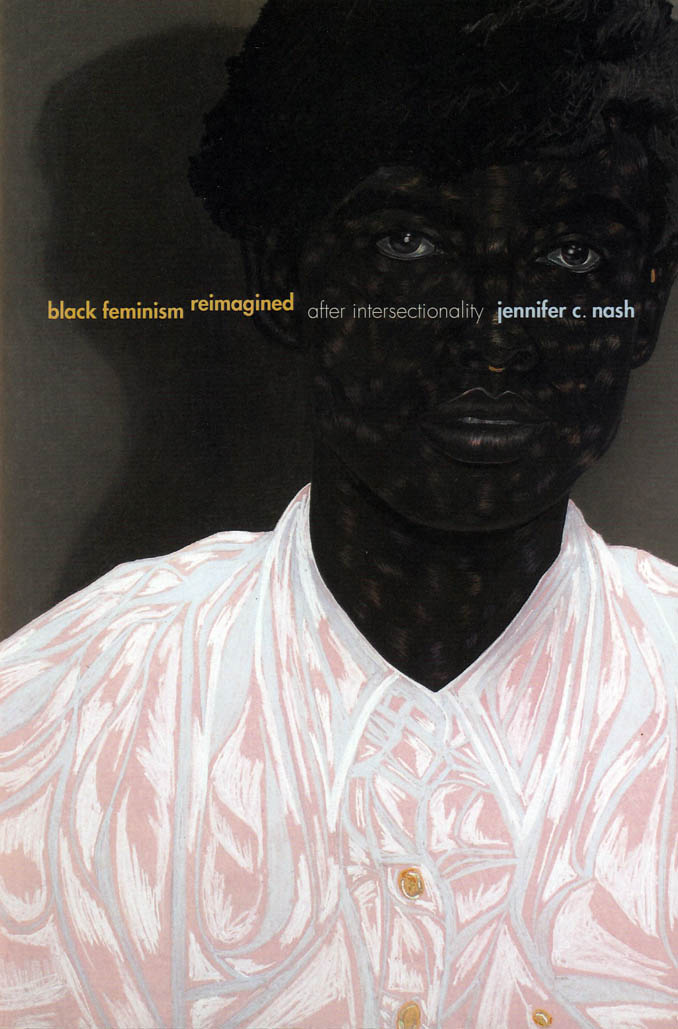
Black Feminism Reimagined
In Black Feminism Reimagined Jennifer C. Nash reframes black feminism's engagement with intersectionality, often celebrated as its primary intellectual and political contribution to feminist theory. Charting the institutional history and contemporary uses of intersectionality in the academy, Nash outlines how women's studies has both elevated intersectionality to the discipline's primary program-building initiative and cast intersectionality as a threat to feminism's coherence. As intersectionality has become a central feminist preoccupation, Nash argues that black feminism has been marked by a single affect—defensiveness—manifested by efforts to police intersectionality's usages and circulations. Nash contends that only by letting go of this deeply alluring protectionist stance, the desire to make property of knowledge, can black feminists reimagine intellectual production in ways that unleash black feminist theory's visionary world-making possibilities.
(March 2019)
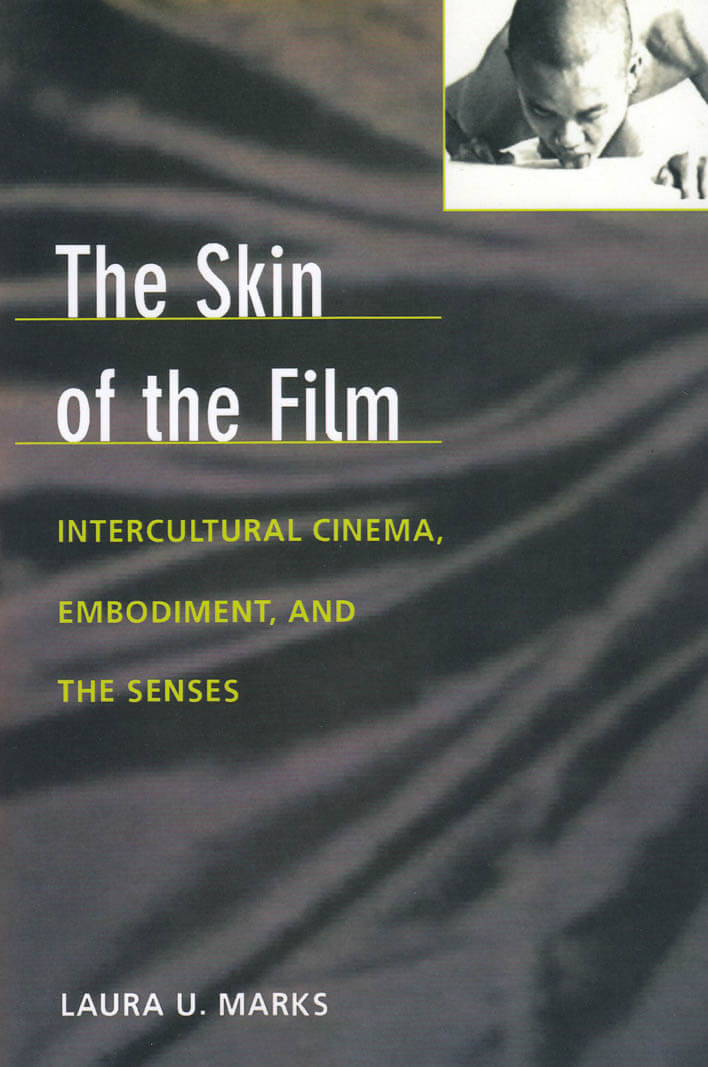
The Skin of the Film
Memories that evoke the physical awareness of touch, smell, and bodily presence can be vital links to home for people living in diaspora from their culture of origin. How can filmmakers working between cultures use cinema, a visual medium, to transmit that physical sense of place and culture? In The Skin of the Film Laura U. Marks offers an answer, building on the theories of Gilles Deleuze and others to explain how and why intercultural cinema represents embodied experience in a postcolonial, transnational world.
Much of intercultural cinema, Marks argues, has its origin in silence, in the gaps left by recorded history. Filmmakers seeking to represent their native cultures have had to develop new forms of cinematic expression. Marks offers a theory of “haptic visuality”—a visuality that functions like the sense of touch by triggering physical memories of smell, touch, and taste—to explain the newfound ways in which intercultural cinema engages the viewer bodily to convey cultural experience and memory. Using close to two hundred examples of intercultural film and video, she shows how the image allows viewers to experience cinema as a physical and multisensory embodiment of culture, not just as a visual representation of experience. Finally, this book offers a guide to many hard-to-find works of independent film and video made by Third World diasporic filmmakers now living in the United States, Great Britain, and Canada.
The Skin of the Film draws on phenomenology, postcolonial and feminist theory, anthropology, and cognitive science. It will be essential reading for those interested in film theory, experimental cinema, the experience of diaspora, and the role of the sensuous in culture.
(Jan 2000)
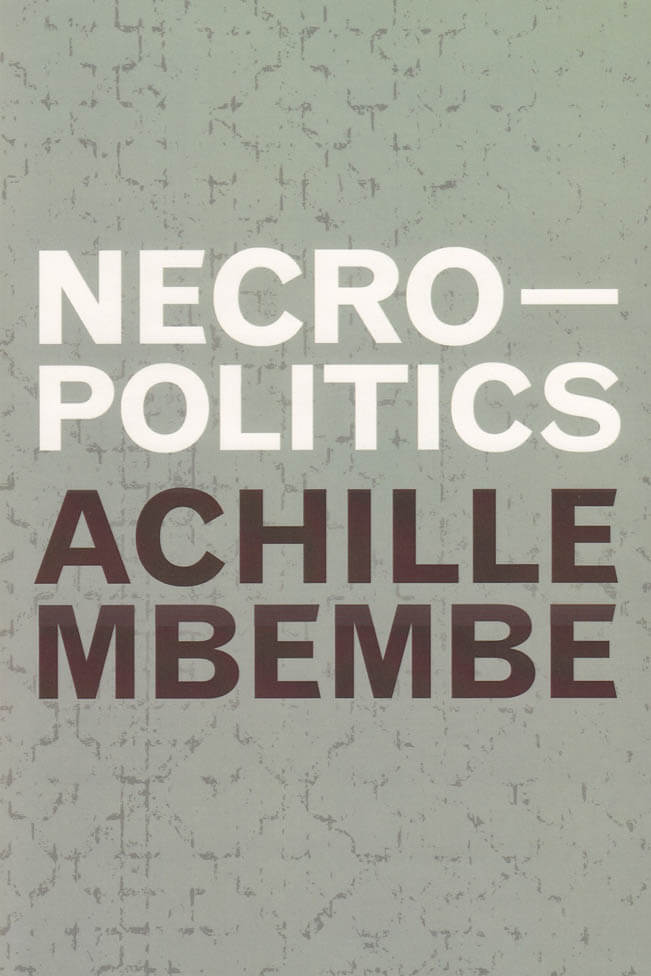
Necropolitics
In Necropolitics Achille Mbembe, a leader in the new wave of francophone critical theory, theorizes the genealogy of the contemporary world, a world plagued by ever-increasing inequality, militarization, enmity, and terror as well as by a resurgence of racist, fascist, and nationalist forces determined to exclude and kill. He outlines how democracy has begun to embrace its dark side—-what he calls its “nocturnal body”—-which is based on the desires, fears, affects, relations, and violence that drove colonialism. This shift has hollowed out democracy, thereby eroding the very values, rights, and freedoms liberal democracy routinely celebrates. As a result, war has become the sacrament of our times in a conception of sovereignty that operates by annihilating all those considered enemies of the state. Despite his dire diagnosis, Mbembe draws on post-Foucauldian debates on biopolitics, war, and race as well as Fanon's notion of care as a shared vulnerability to explore how new conceptions of the human that transcend humanism might come to pass. These new conceptions would allow us to encounter the Other not as a thing to exclude but as a person with whom to build a more just world.
(October 2019)
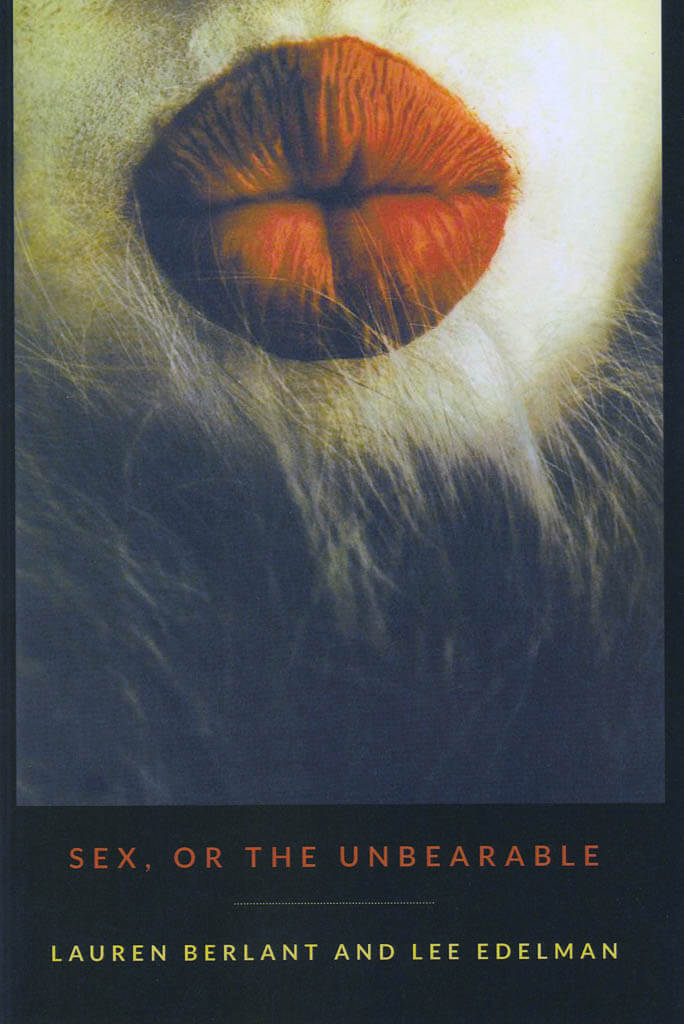
Sex, or the Unbearable
Sex, or the Unbearable is a dialogue between Lauren Berlant and Lee Edelman, two of our leading theorists of sexuality, politics, and culture. In juxtaposing sex and the unbearable they don't propose that sex is unbearable, only that it unleashes unbearable contradictions that we nonetheless struggle to bear. In Berlant and Edelman's exchange, those terms invoke disturbances produced in encounters with others, ourselves, and the world, disturbances that tap into threats induced by fears of loss or rupture as well as by our hopes for repair.
Through virtuoso interpretations of works of cinema, photography, critical theory, and literature, including Lydia Davis's story "Break It Down" (reprinted in full here), Berlant and Edelman explore what it means to live with negativity, with those divisions that may be irreparable. Together, they consider how such negativity affects politics, theory, and intimately felt encounters. But where their critical approaches differ, neither hesitates to voice disagreement. Their very discussion—punctuated with moments of frustration, misconstruction, anxiety, aggression, recognition, exhilaration, and inspiration—enacts both the difficulty and the potential of encounter, the subject of this unusual exchange between two eminent critics and close friends.
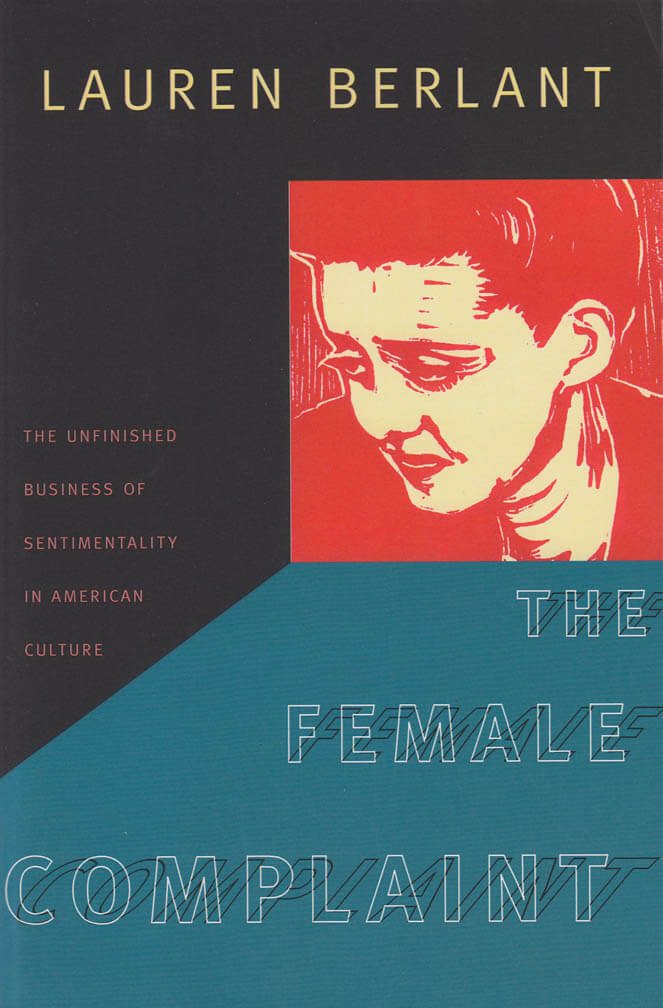
The Female Complaint
The Female Complaint is part of Lauren Berlant’s groundbreaking “national sentimentality” project charting the emergence of the U.S. political sphere as an affective space of attachment and identification. In this book, Berlant chronicles the origins and conventions of the first mass-cultural “intimate public” in the United States, a “women’s culture” distinguished by a view that women inevitably have something in common and are in need of a conversation that feels intimate and revelatory. As Berlant explains, “women’s” books, films, and television shows enact a fantasy that a woman’s life is not just her own, but an experience understood by other women, no matter how dissimilar they are. The commodified genres of intimacy, such as “chick lit,” circulate among strangers, enabling insider self-help talk to flourish in an intimate public. Sentimentality and complaint are central to this commercial convention of critique; their relation to the political realm is ambivalent, as politics seems both to threaten sentimental values and to provide certain opportunities for their extension.
Pairing literary criticism and historical analysis, Berlant explores the territory of this intimate public sphere through close readings of U.S. women’s literary works and their stage and film adaptations. Her interpretation of Uncle Tom’s Cabin and its literary descendants reaches from Harriet Beecher Stowe to Toni Morrison’s Beloved, touching on Shirley Temple, James Baldwin, and The Bridges of Madison County along the way. Berlant illuminates different permutations of the women’s intimate public through her readings of Edna Ferber’s Show Boat; Fannie Hurst’s Imitation of Life; Olive Higgins Prouty’s feminist melodrama Now, Voyager; Dorothy Parker’s poetry, prose, and Academy Award–winning screenplay for A Star Is Born; the Fay Weldon novel and Roseanne Barr film The Life and Loves of a She-Devil; and the queer, avant-garde film Showboat 1988–The Remake. The Female Complaint is a major contribution from a leading Americanist.

What The Fire Sees
A collection of anti-capitalist poetry, philosophy, cultural analysis, legal studies, manifesto and critique spanning 1996 to the present by Alenka Zupančič, Alexander Kluge, Amy Ireland, Anne Boyer, Aurelia Guo, Bini Adamczak, Carolyn Lazard, Chi Chi Shi, Denis Ekpo, Feminist Judgments Project, Gili Tal, Houria Bouteldja, Huw Lemmey, Keziah Craven, Marina Vishmidt, Nat Raha, Sarah Lamble, Teflon and Vanessa Place.
Divided we fall, but where do we land? This collection explores some of the grounds on which thinking and writing can begin again.
– Sadie Plant